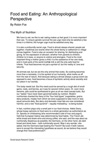Food and Eating: An Anthropological Perspective
– By Robin Fox
The Myth of Nutrition
We have to eat; we like to eat; eating makes us feel good; it is more important than sex. To ensure genetic survival the sex urge need only be satisfied a few times in a lifetime; the hunger urge must be satisfied every day.
It is also a profoundly social urge. Food is almost always shared; people eat together; mealtimes are events when the whole family or settlement or village comes together. Food is also an occasion for sharing, for distributing and giving, for the expression of altruism, whether from parents to children, children to in-laws, or anyone to visitors and strangers. Food is the most important thing a mother gives a child; it is the substance of her own body, and in most parts of the world mother’s milk is still the only safe food for infants. Thus food becomes not just a symbol of, but the reality of, love and security.
All animals eat, but we are the only animal that cooks. So cooking becomes more than a necessity, it is the symbol of our humanity, what marks us off from the rest of nature. And because eating is almost always a group event (as opposed to sex), food becomes a focus of symbolic activity about sociality and our place in our society.
The body needs fuel. But this need could be served by a rough diet of small game, roots, and berries, as it was for several million years. Or, even more extreme, pills could be synthesized to give us all we need (except bulk). But our "tastes" have never been governed solely by nutrition. Modern nutritionists chanted the litany of the "four food types" (vegetables, grains, dairy products, meats) from which we were supposed to take more or less equal amounts daily. But dairy and domestic meat fats are now considered harmful, and a new "food pyramid" - equally misleading - is being touted.
In fact, nutrition plays only a small part in our food choices. Adele Davis, whose bossy opinions on food were to a whole generation as authoritative as Dr. Spock’s on childrearing (she recommended a diet of liver and yogurt), held that European history was determined by food habits. The French ate white bread and drank wine and strong coffee, she said, and this was about as nutritionally disastrous as possible; the Germans, on the other hand, ate dark bread and drank beer - both nutritionally sound. Was it any wonder, she asked, that the Germans kept beating the French? But even if both nations were to accept this interesting hypothesis as sound, do we believe they would change their food preferences?
Nor are these preferences solely governed by what is available. All cultures go to considerable lengths to obtain preferred foods, and often ignore valuable food sources close at hand. The English do not eat horse and dog; Mohammedans refuse pork; Jews have a whole litany of forbidden foods (see Leviticus); Americans despise offal; Hindus taboo beef - and so on. People will not just eat anything, whatever the circumstances. In fact, omnivorousness is often treated as a joke. The Chinese are indeed thought by their more fastidious neighbors to eat anything. The Vietnamese used to say that the best way to get rid of the Americans would be to invite in the Chinese, who would surely find them good to eat.


